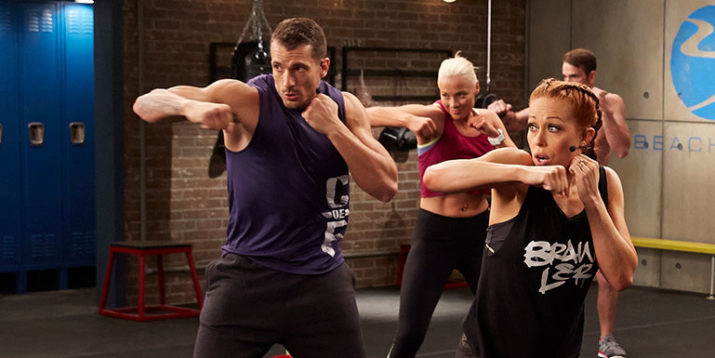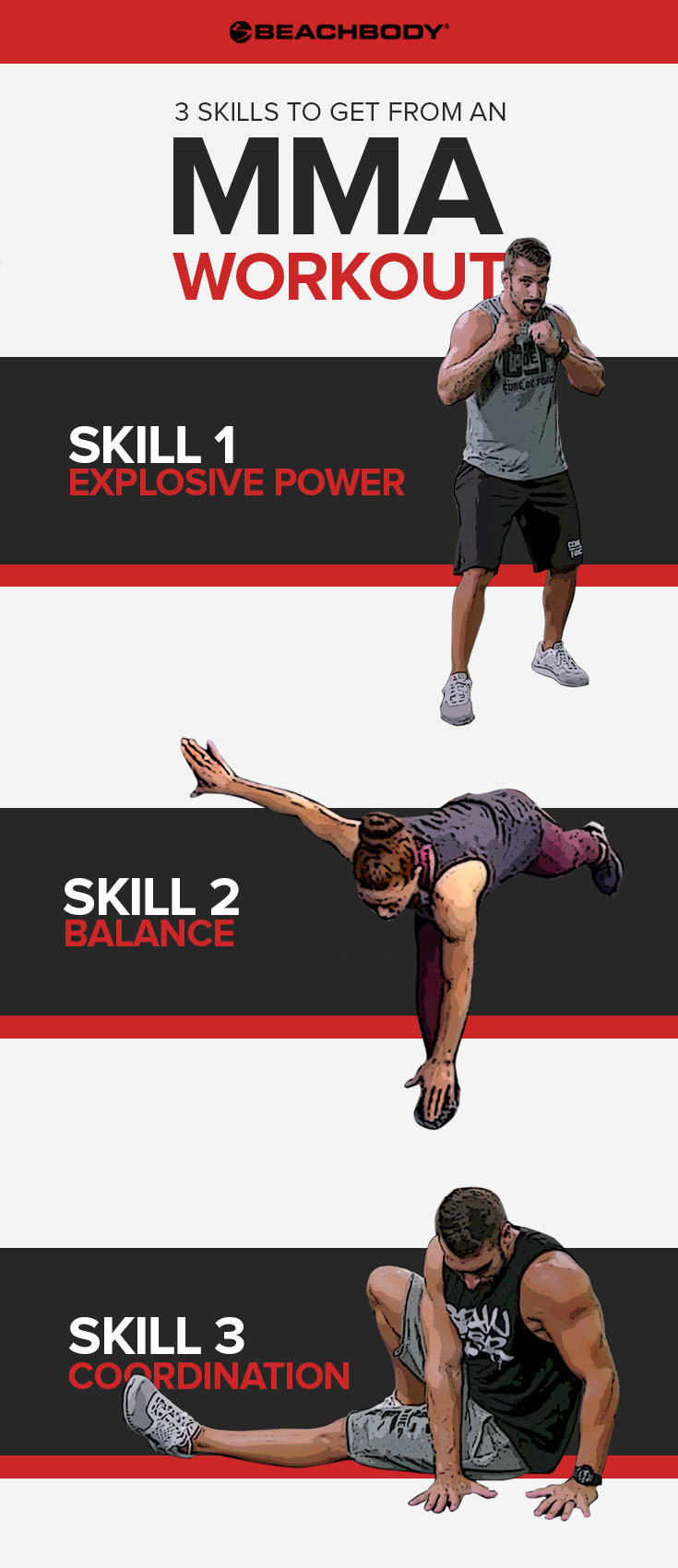3 Fitness Results You Can Get From an MMA Workout

If you’re among those who consider themselves athletes, there’s more to fitness than simply being strong or lean. Skills like power, speed, agility, coordination, reaction time, and balance enhance your overall fitness, athletic ability, and performance. You won’t get all that on the elliptical or in barre class — but you can in a mixed martial arts (MMA) workout.
“It challenges your body in so many more ways than ‘traditional’ workouts do,” says Super Trainer Joel Freeman, co-creator of Core De Force, Beachbody’s MMA-inspired program. And it’s apparent in the way that MMA fighters train and move: “You’re moving in all planes of motion, coordinating kicks and punches, transitioning between the floor and standing, and working on speed and balance.”
That trains your nervous system and makes you faster and more agile. But it also translates into extra calories burned, stronger muscles, and less fat.
Let’s take a closer look at three specific athletic skills you can expect to develop during an MMA-style workout and a corresponding move that can help you get them.
1. Explosive Power
Plyometrics — eruptive jumping or bounding moves — are an excellent way to train your muscles to work quicker and more powerfully. “Plyo work targets your fast-twitch muscle fibers and prompts your muscles to produce more force,” says Freeman. It’s like hitting the turbo button on your workout, and boy does it spike your heart rate.
Core De Force move to try: Ground-to-fighter stance
Found in: MMA Power, Round 4
- Start in your dominant fight stance with your non-dominant foot forward (righties, put your left foot in front; lefties, do the opposite). Keep your elbows bent with your hands in fists near your face.
- Drop to a squat, placing your hands on the ground, and jump your feet back, lowering your entire body to the floor. The minute your chest hits, explosively push up, springing your hands off the ground as you jump your feet back into starting position, this time with your stance switched (dominant foot forward), and rise up.
- Alternate back and forth for 30 seconds. (Try to do it without swearing.)
2. Balance
Moves that challenge your balance engage your hip muscles (especially the gluteus medius), which are crucial for keeping your pelvis stable when you’re doing super-complicated things that require you to spend time on just one leg. You know, like walking or running. (Yes, they’re that important.)
“As we get older, you can tell who’s done balance training and who hasn’t, just by the way they walk or stand,” says Freeman. In fact, anyone who works with bodies, such as trainers or physical therapists, can spot weak glutes a mile away.
And if someone complains of back pain — which afflicts about 80 percent of people — glute weakness is often the culprit. Let’s just leave it at this: Everybody needs balance training.
Core De Force move to try: Single-leg balance with kick
Found in: Dynamic Strength, Rounds 1 & 2
- Stand on your right foot and lift your left foot off the ground. (Take a second here with your hands on your hip bones and check to see if one side is dipping down or hiking up. Try to make them even.)
- Keeping your hips squared forward and back flat, bend forward from your hips and reach your left hand toward your right foot. (Your rear leg stays bent and fairly relaxed; its part is coming next.)
- Rise up, bring your fists next to your face, and kick your left leg forward, leaning back slightly as you extend your leg. Move slowly and deliberately.
- If you want, you can extend your other arm out as you bend over for more balance, and you can tap your foot lightly on the ground to stabilize yourself before kicking forward. Repeat for 50 seconds, then switch legs.
3. Coordination
If the movie title of your life would be My Two Left Feet, you could benefit from coordination training. Teaching your brain and muscles to move your body when and where you want (and even when you don’t have more than a split second to think about it) is invaluable.
“It helps prevent injuries, makes you more fluid in your movements, and makes you stronger for the rest of your day,” says Freeman. “To challenge your coordination, you generally have to do something completely unfamiliar that you haven’t done before.” In other words, you’re going to feel awkward at first, so don’t panic as your brain adjusts to the muscle sequencing necessary to stabilize and contract during these new movement patterns.
Core De Force move to try: Sit-up escape
Found in: Dynamic Strength, Round 12
- Lie on your back with your right leg extended on the floor and your left knee bent with your heel against your butt on the floor.
- Sit up (use your abs, not your arms), turn your torso to the right and place your hands shoulder-width apart on the floor just outside your right hip.
- Push up, shifting your weight to your hands, and pivot on your left foot as you bring your right foot beside it. You should be crouched on your hands and toes, shins parallel with the floor.
- Rotate your lower body to the right, extending your left leg while keeping your right leg bent and your heel still against your butt. Softly lower back down to the floor, returning to the starting position. Repeat for 50 seconds, trying to go a little faster and making it more graceful as you get the hang of it.
Dial up these CORE DE FORCE workouts and hundreds more, including 21 Day Fix and P90X3 at Beachbody On Demand. Now you can stream them anywhere, any time on a mobile device or television set-top box.

